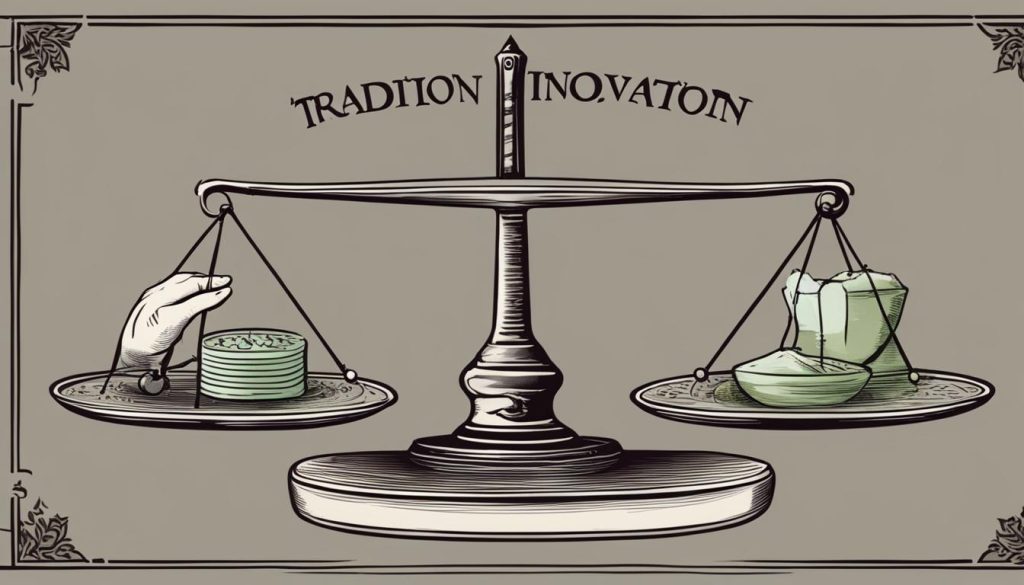Welcome to our series on modernizing the 12 steps of recovery! In this article, we will explore how a fresh approach to the traditional recovery process can bring about positive change and improved outcomes. If you’re looking for updated recovery strategies and a new perspective on healing and self-improvement, you’re in the right place.
Recovery is a journey that requires adaptation and growth. As society evolves, so do our understanding and approaches to addiction recovery. It’s crucial to embrace change and explore innovative ways to navigate the path to recovery.
Throughout this series, we will discuss the need for modern approaches to the 12 step program, the importance of embracing diversity and overcoming resistance, and the impact of digitalization on the recovery process. We will also explore contemporary language in traditional recovery settings, progressive recovery techniques, and the influence of cultural shifts on recovery narratives.
By modernizing the 12 steps of recovery, we can ensure that they remain relevant and effective in today’s world. This requires balancing tradition and innovation, integrating new research and understanding, and fostering inclusivity within the recovery community.
Whether you are beginning your recovery journey or seeking new perspectives as a seasoned individual in recovery, this series will provide valuable insights and strategies to support your healing and growth. Join us as we navigate the exciting terrain of modernized recovery approaches.
Embracing Change in Recovery Programs
In order to ensure effective and impactful recovery, it is crucial to embrace change in recovery programs. Modern approaches to the 12-step program have proven to be more beneficial for individuals seeking healing and self-improvement. By incorporating contemporary strategies, recovery programs can adapt to the evolving needs of individuals on their journey to recovery.
The Need for Modern Approaches to the 12 Step Program
The traditional 12-step program has long been a cornerstone of recovery, but as times change, so do the challenges faced by individuals in recovery. By adopting modern approaches, recovery programs can address these new challenges more effectively. Modernizing the 12 steps allows for a fresh perspective and encourages individuals to take an active role in their recovery journey.
The Role of Diversity in the Evolution of the 12 Steps
Diversity plays a vital role in the evolution of the 12 steps. By embracing diversity, recovery programs can create a more inclusive environment that caters to the unique needs of all individuals. The 12 steps can be tailored to accommodate various cultural backgrounds, experiences, and perspectives, making the recovery journey more relatable and accessible to a wider range of individuals.
Facing Resistance and Fostering Acceptance
Implementing new recovery strategies can be met with resistance, both from individuals in recovery and from within the recovery community. Overcoming this resistance is essential for progress. By fostering acceptance and open-mindedness, recovery programs can pave the way for positive change. Education, support, and ongoing dialogue are key in overcoming resistance and promoting the adoption of modern approaches to recovery.

| Benefits of Embracing Change in Recovery Programs | Challenges of Embracing Change in Recovery Programs |
|---|---|
|
|
The Journey of the Big Book’s Editions
In this section, we will take a closer look at the journey of the Big Book’s editions. The Big Book, formally known as “Alcoholics Anonymous: The Story of How More Than One Hundred Men Have Recovered from Alcoholism,” is a foundational text in the recovery community. Since its publication in 1939, the Big Book has undergone several editions, reflecting the evolving understanding of addiction and recovery strategies.
The history of the Big Book editions begins with its first printing in 1939, which consisted of approximately 400 pages and detailed the experiences, principles, and program of the early members of Alcoholics Anonymous (AA). Over the years, subsequent editions were released to incorporate new insights, research, and experiences gathered from the growing AA fellowship.
One significant aspect of the evolution of the Big Book is the changes made to the content over time. Early editions featured stories primarily from the original members of AA, while later editions included contributions from members worldwide. These additions provided diverse perspectives and experiences, making the Big Book more relatable and inclusive.
Another important development in the Big Book’s editions is the refinement and expansion of the 12 steps of recovery. The 12 steps serve as a guiding framework for individuals seeking recovery, and each edition of the Big Book has offered revisions and clarifications to enhance their effectiveness.

By examining the journey of the Big Book’s editions, we can gain a deeper understanding of how recovery strategies have evolved and adapted to meet the needs of individuals in recovery. The changes in the Big Book reflect a continual effort to improve and refine the recovery process, ensuring that it remains relevant and effective in today’s world.
Contemporary Language in Traditional Recovery
Updating the 12 steps with 21st-century vernacular and understanding alcoholism through the lens of today’s society are two crucial aspects of modernizing traditional recovery programs. By incorporating contemporary language into the recovery process, individuals can relate more readily to the principles and concepts of the 12 steps, making them more accessible and relatable.
The use of updated language in recovery programs has several benefits. Firstly, it helps to bridge the gap between the traditional recovery approach and the contemporary language and culture of the modern world. By using language that resonates with individuals in recovery, we can create a more inclusive and relevant recovery environment.
Furthermore, updating the 12 steps with 21st-century vernacular can increase engagement and understanding among those seeking recovery. The language we use shapes our perception and interpretation of concepts. By using contemporary language, we can reframe the 12 steps in a way that aligns with the experiences and challenges faced by individuals in today’s society.
The image below illustrates the importance of contemporary language in recovery:

By understanding alcoholism through today’s lens, we can gain valuable insights into the complexities of addiction and recovery. The modern world presents unique stressors, societal pressures, and cultural factors that can influence the development and treatment of alcoholism. Incorporating this understanding into recovery programs allows us to tailor interventions and support strategies to address the specific needs and challenges faced by individuals in the modern world.
Overall, using contemporary language and understanding alcoholism through today’s lens are essential elements of modernizing traditional recovery. By updating the 12 steps with 21st-century vernacular and aligning recovery strategies with the realities of the modern world, we can enhance the effectiveness and relevance of the recovery process, ultimately helping individuals achieve lasting healing and self-improvement.
Modernized 12 Step Approach: Balancing Tradition and Innovation
In the realm of recovery, striking a delicate balance between tradition and innovation is crucial for fostering personal growth and lasting healing. A modernized 12 step approach acknowledges the importance of preserving the core principles that have proven effective over time, while embracing new strategies and techniques that address the evolving needs and challenges faced by individuals seeking recovery.
This approach recognizes that recovery is not a one-size-fits-all journey. It acknowledges that what worked in the past may not necessarily work for everyone today. By incorporating innovative methods and contemporary insights, the modernized 12 step approach offers a fresh perspective on recovery, one that resonates with a diverse range of individuals and fosters a sense of inclusivity.
Modernizing the 12 steps involves updating the language, adopting a more contemporary vernacular that is relatable and accessible to individuals seeking recovery in the 21st century. It also entails integrating new research and scientific advancements into the recovery process, ensuring that evidence-based practices are incorporated for enhanced efficacy.
However, it is important to note that while innovation is key, maintaining the integrity and essence of the traditional 12 steps is equally vital. Balancing tradition and innovation requires careful thought and consideration. It means honoring the legacy of the 12 steps while actively seeking ways to adapt and improve upon them.
This modernized approach offers individuals in recovery a unique opportunity to benefit from the wisdom and time-tested principles of the traditional 12 steps, while also embracing new ideas, strategies, and techniques that align with contemporary needs. It creates a dynamic and ever-evolving framework that addresses the complexities of addiction and supports individuals in their pursuit of a fulfilling and sustainable recovery.

Impact of Digitalization on Recovery
In today’s digital age, technology has had a profound impact on various aspects of our lives, including the recovery process. The digitalization of recovery has opened up new possibilities and avenues for individuals seeking support and resources. Online recovery platforms have emerged as powerful tools that are revolutionizing the way people access help and connect with others on their recovery journey.
Online Recovery Platforms and Their Growing Influence
Online recovery platforms have gained significant traction in recent years, providing a convenient and accessible way for individuals to connect with others who share similar experiences and challenges. These platforms offer various resources and support networks, allowing people to find guidance, encouragement, and a sense of community from the comfort of their own homes.
Through online recovery platforms, individuals can engage in virtual support groups, join discussion forums, access educational materials, and even participate in online therapy sessions. The 24/7 availability of these platforms ensures that individuals have continuous access to support, regardless of their geographical location or time zone.
The Intersection of Technology and the 12 Steps
The digitalization of the 12 steps has enabled individuals to incorporate technology into their recovery journey. Smartphone applications and web-based tools have been developed to complement and enhance the traditional 12-step process. These digital resources provide convenient access to recovery literature, daily meditations, progress tracking, and interactive exercises.
Furthermore, technology has enabled the personalization of the 12 steps, tailoring them to the specific needs and preferences of individuals. Digital platforms allow users to customize their recovery plans, set goals, and receive personalized reminders and prompts to stay on track. The integration of technology and the 12 steps offers a comprehensive approach to recovery, combining the wisdom of the traditional program with the benefits of digital tools.
12 Steps of Recovery Modernized
In the ever-evolving landscape of addiction recovery, it is essential to adapt traditional approaches to meet the needs of the modern world. The 12 steps of recovery, a cornerstone of many recovery programs, have also undergone modernization. By updating and modernizing these steps, individuals seeking recovery can benefit from a fresh perspective and an updated approach that aligns with contemporary challenges.
When examining the modernized 12 steps of recovery, it becomes evident that they have been carefully adapted to address the unique complexities of today’s society. These updated steps acknowledge the changes in societal norms, technology, and the understanding of addiction, offering individuals a more relevant and effective pathway to healing.

The modernized 12 steps take into account the growing diversity of individuals seeking recovery. They embrace inclusivity and recognize the importance of incorporating a variety of perspectives and experiences. By doing so, these updated steps create a more supportive and relatable framework for individuals from different backgrounds, fostering a sense of belonging and acceptance within the recovery community.
Furthermore, the modernized 12 steps also emphasize the use of contemporary language and terminology. By utilizing 21st-century vernacular, these steps become more accessible and relatable to individuals in recovery. This linguistic update eliminates potential barriers and allows for a clearer understanding of the recovery process, ensuring that no one feels excluded or disconnected due to outdated language.
The updated recovery process acknowledges the influence of technological advancements. With the digitalization of recovery resources and the rise of online recovery platforms, individuals can access support and connect with others regardless of their geographical location. The modernized 12 steps recognize the intersection of technology and recovery, incorporating digital tools and resources into the healing journey.
By embracing the modernized 12 steps of recovery, individuals can explore new insights, strategies, and approaches to their healing journey. These updated steps take into account the evolving landscape of addiction recovery, ensuring that the core principles of the traditional 12 steps are preserved while incorporating fresh perspectives and techniques.
As we navigate the complexities of addiction in the modern world, it is crucial to embrace the modernized 12 steps of recovery. By doing so, individuals can embark on a healing journey that is tailored to their needs and designed to address the challenges of contemporary society. The modernized 12 steps provide a roadmap for personal growth, self-discovery, and lasting recovery in the face of changing times.
Progressive Recovery Techniques and Their Efficacy
In the ever-evolving field of addiction recovery, it is crucial to explore and integrate progressive techniques that enhance the efficacy of the recovery process. By embracing evidence-based approaches, individuals can benefit from the latest advancements in the field of addiction recovery. This section will delve into the significance of incorporating new research on addiction into recovery practices and the role of science in redefining the traditional 12 steps.
Integrating New Research on Addiction into Recovery
As research on addiction continues to advance, it provides invaluable insights into the nature of substance abuse and effective recovery methods. By integrating this new research into recovery programs, individuals can benefit from evidence-based techniques that have proven to be successful in addressing addiction.
“The integration of new research on addiction into recovery practices allows us to tailor treatment plans to individual needs, resulting in better outcomes and long-lasting recovery.” – Dr. Emma Thompson, Addiction Researcher
This integration involves utilizing approaches such as cognitive-behavioral therapy, motivational interviewing, and mindfulness-based interventions, which have shown significant promise in helping individuals overcome addiction. By embracing these progressive recovery techniques, recovery programs can address the multifaceted aspects of addiction and provide individuals with personalized strategies for lasting recovery.
The Role of Science in Redefining the 12 Steps
The traditional 12 steps of recovery have been a cornerstone of addiction treatment for decades. However, with advancements in scientific understanding and the evolving landscape of addiction, it is essential to reevaluate and redefine these steps to ensure their continued effectiveness.
Science plays a critical role in shedding light on the underlying mechanisms of addiction and identifying novel approaches to recovery. By integrating scientific research into the development and implementation of the 12 steps, recovery programs can better address the complex nature of addiction and enhance the success rates of individuals seeking recovery.
Researchers are continually studying the neurobiology of addiction, psychological factors influencing substance abuse, and effective therapeutic interventions. By incorporating this scientific knowledge, the 12 steps can be adapted to align with current understandings of addiction and provide individuals with a comprehensive roadmap for recovery.

Reimagining the 12 Steps for an Inclusive Fellowship
In recovery, embracing diversity and fostering inclusivity are crucial elements in creating a supportive and welcoming environment for individuals from all backgrounds. By reimagining the 12 steps, we can ensure that everyone feels seen, heard, and valued on their recovery journey.
The traditional 12-step program has been instrumental in helping countless individuals find healing and sobriety. However, it’s important to acknowledge that the path to recovery is not one-size-fits-all. People come from diverse backgrounds, cultures, and experiences, and their unique perspectives must be recognized and honored.
Reimagining the 12 steps involves incorporating different perspectives and experiences into the recovery process. This can be achieved by:
- Recognizing the intersectionality of addiction: Understanding that addiction affects individuals differently based on factors such as race, ethnicity, gender, sexuality, and socioeconomic background. By acknowledging these intersections, we can address the specific challenges and needs of diverse communities.
- Expanding the language of recovery: Language plays a vital role in creating an inclusive fellowship. Updating the language used in the 12 steps with inclusive and gender-neutral terms can make them more relatable and accessible to a wider range of individuals.
- Promoting diverse representation: Inclusivity in recovery fellowships requires diverse representation at all levels, from leadership positions to sponsorship roles. Creating opportunities for underrepresented individuals to share their stories and contribute to the recovery community is essential for building an inclusive fellowship.
- Providing culturally competent support: Recognizing the unique cultural contexts in which individuals navigate their recovery journey is crucial. By providing culturally competent support, we can ensure that everyone receives the guidance and resources they need to thrive in their sobriety.
Reimagining the 12 steps for an inclusive fellowship is an ongoing process that requires open-mindedness and a willingness to learn from diverse perspectives. By fostering an environment where everyone feels welcomed and affirmed, we can strengthen the recovery community and empower individuals from all walks of life to find lasting healing and transformation.
Overcoming Obstacles to Modernization in Recovery
In the process of modernizing the recovery journey, individuals often encounter obstacles that can hinder progress and growth. These challenges, however, should not deter you from embracing change and finding innovative approaches to healing and self-improvement. In this section, we will explore the challenges of altering a ‘sacred text’ like the 12 steps and the importance of preserving the essence of recovery while making necessary changes to adapt to contemporary needs.
Challenges of Altering a ‘Sacred Text’
When it comes to the 12 steps of recovery, they hold a profound significance in the lives of many individuals seeking healing. The established structure, language, and principles have been deeply embedded in recovery culture for decades. Therefore, altering this ‘sacred text’ can provoke resistance and skepticism.
One of the main challenges arises from the fear of losing the tried-and-true methods that have helped countless individuals overcome addiction. The fear of change and the uncertainty of the effectiveness of modernized approaches can be strong barriers to embracing innovation in recovery.
Moreover, the 12 steps often carry a sense of tradition and legacy. They have stood the test of time and have become synonymous with recovery itself. Altering these steps can feel like tampering with a fundamental pillar of the recovery process, potentially undermining its credibility in the eyes of those who adhere strictly to the original teachings.
Preserving the Essence While Making Necessary Changes
Despite the challenges, it is crucial to preserve the essence of recovery while making necessary adaptations to meet the demands of the modern world. By finding a balance between tradition and innovation, individuals can honor the core principles and value system of the 12 steps while incorporating contemporary insights and strategies.
Preserving the essence of recovery involves identifying the timeless truths embedded within the 12 steps and translating them into modern contexts. Emphasizing the importance of honesty, self-reflection, support, and personal responsibility can guide the process of modernization without compromising the underlying principles.
Additionally, fostering open-mindedness and creating space for dialogue and collaboration are key in navigating the obstacles to modernization. By involving diverse perspectives and inviting the recovery community to contribute to the evolution of the 12 steps, a collective sense of ownership and shared purpose can be cultivated.
Ultimately, overcoming the obstacles to modernization in recovery requires patience, empathy, and a willingness to challenge the status quo. By embracing change and preserving the essence of recovery, individuals can embark on a modernized recovery journey that is better equipped to address the challenges of addiction in the 21st century.
The Influence of Cultural Shifts on Recovery Narratives
In today’s rapidly changing world, cultural shifts have a profound impact on various aspects of our lives, including the way we approach recovery. As societal norms and values evolve, it is crucial to recognize how these changes shape recovery narratives and adjust our strategies accordingly. By understanding and adapting to cultural shifts in recovery, individuals can embark on a healing journey that aligns with contemporary values and beliefs.
Cultural shifts in recovery encompass a wide range of changes, from the destigmatization of addiction to the recognition of diverse perspectives and experiences. These shifts reflect a growing understanding of the complex nature of addiction and the need for inclusive approaches to recovery.
One significant cultural shift is the increasing emphasis on mental health and self-care. As society becomes more open about mental health challenges, individuals in recovery are empowered to prioritize their well-being and seek professional help without shame. This shift encourages a holistic approach to recovery that addresses not only substance use but also underlying mental and emotional factors.
Another cultural shift is the acknowledgment of diverse pathways to recovery. While traditional recovery narratives often highlight the 12-step model, there is now a greater recognition of alternative approaches that resonate with individuals from different backgrounds and belief systems. This inclusivity allows for a more personalized recovery experience and fosters a sense of empowerment and autonomy in the healing process.
Furthermore, cultural shifts have led to a deeper understanding of the interconnectedness between addiction and social structures such as gender, race, and socioeconomic status. Individuals in recovery are now encouraged to explore the systemic factors that contribute to addiction, enabling a more comprehensive and compassionate approach to recovery.
By embracing evolving recovery narratives, individuals can tap into a wealth of support, resources, and strategies that are better suited to their unique circumstances. Cultural shifts have created a space for innovation and creativity in recovery, encouraging the development of new modalities and approaches that address the changing needs of those seeking healing.
In conclusion, cultural shifts play a significant role in shaping recovery narratives. Understanding and adapting to these shifts enable individuals to embark on a healing journey that aligns with contemporary values and beliefs. By embracing evolving recovery strategies, we can foster a more inclusive, compassionate, and effective approach to recovery for all.
Conclusion
In conclusion, the modernization of recovery strategies is essential in meeting the evolving needs of individuals seeking healing and self-improvement. While honoring the roots of the 12 steps, it is crucial to embrace new approaches that empower the next generation in their recovery journey.
By evolving recovery strategies, we can adapt to societal changes and ensure that the principles of the 12 steps remain relevant and effective. This fresh take on recovery allows us to navigate the challenges of addiction with renewed hope and resilience.
Empowering the next generation in recovery means equipping them with updated tools and techniques that align with contemporary needs. By embracing modern approaches, we provide individuals with a comprehensive framework that addresses their unique challenges and fosters long-term healing.
Overall, evolving while honoring the roots of the 12 steps is essential for the continued success of the recovery community. By embracing change, we can empower individuals to embark on their recovery journey with confidence, knowing that they have the support and resources necessary for lasting transformation.
FAQ
Why is modernizing the 12 steps of recovery important?
Modernizing the 12 steps of recovery is important because it allows for the adaptation of traditional recovery strategies to better meet the needs of individuals seeking healing and self-improvement. By updating recovery programs, new approaches can be incorporated, leading to better outcomes for those in recovery.
How does embracing change in recovery programs benefit individuals?
Embracing change in recovery programs benefits individuals by allowing for the incorporation of modern approaches and techniques that are better tailored to their specific needs and challenges. It helps to evolve recovery strategies and stay relevant in the ever-changing landscape of addiction recovery.
Why is diversity important in the evolution of the 12 steps?
Diversity is important in the evolution of the 12 steps because it fosters acceptance and a sense of belonging within the recovery community. By including different perspectives and experiences, the 12 steps can become more inclusive and relatable to individuals from all backgrounds.
How can resistance to change be overcome in recovery?
Resistance to change in recovery can be overcome through education, open dialogue, and fostering a supportive environment. By addressing concerns and misconceptions, individuals can be more open to embracing new recovery strategies that can lead to improved outcomes.
What changes have been made to the Big Book editions over time?
The Big Book editions have seen changes in their content over time to accommodate the evolving understanding of addiction and recovery. Updates have been made to reflect new knowledge and provide individuals with more relevant information and strategies for their journey to sobriety.
How does using contemporary language in recovery contribute to its effectiveness?
Using contemporary language in recovery makes the 12 steps and recovery programs more relatable and accessible to individuals in the 21st century. By updating the language used, individuals can better understand and engage with the recovery process, leading to better outcomes.
How can a modernized 12 step approach balance tradition and innovation?
A modernized 12 step approach can balance tradition and innovation by maintaining the core principles of the 12 steps while incorporating new strategies and techniques that align with contemporary needs and challenges. It combines the wisdom of tradition with the advancements of modern recovery practices.
How does digitalization impact the recovery process?
Digitalization has revolutionized the recovery process by providing individuals with online recovery platforms that offer support, resources, and networking opportunities. It has made recovery more accessible, convenient, and connected, enhancing the overall recovery journey.
What are the modernized 12 steps of recovery?
The modernized 12 steps of recovery are an adaptation of the traditional steps to better align with contemporary needs and challenges. They incorporate new insights and approaches that individuals can use to navigate their healing journey in a more effective and meaningful way.
How do progressive recovery techniques improve the recovery process?
Progressive recovery techniques improve the recovery process by integrating new research on addiction into recovery practices. By embracing evidence-based approaches, individuals can benefit from the latest advancements in the field of addiction recovery, leading to better outcomes.
How can the 12 steps be reimagined for an inclusive fellowship?
The 12 steps can be reimagined for an inclusive fellowship by embracing diversity and incorporating different perspectives and experiences into recovery strategies. By fostering inclusivity, recovery fellowships can create a supportive and welcoming environment for individuals from all backgrounds.
What are the challenges of modernizing the recovery process?
The challenges of modernizing the recovery process include overcoming resistance to change and preserving the essence of recovery while making necessary adaptations. Altering a ‘sacred text’ like the 12 steps can be challenging, but it is essential to evolve recovery strategies to meet contemporary needs.
How do cultural shifts impact recovery narratives?
Cultural shifts impact recovery narratives by shaping the way individuals perceive and approach recovery. Understanding these cultural shifts allows for the adaptation of recovery strategies to align with contemporary values and beliefs, facilitating a more meaningful and effective healing journey.

